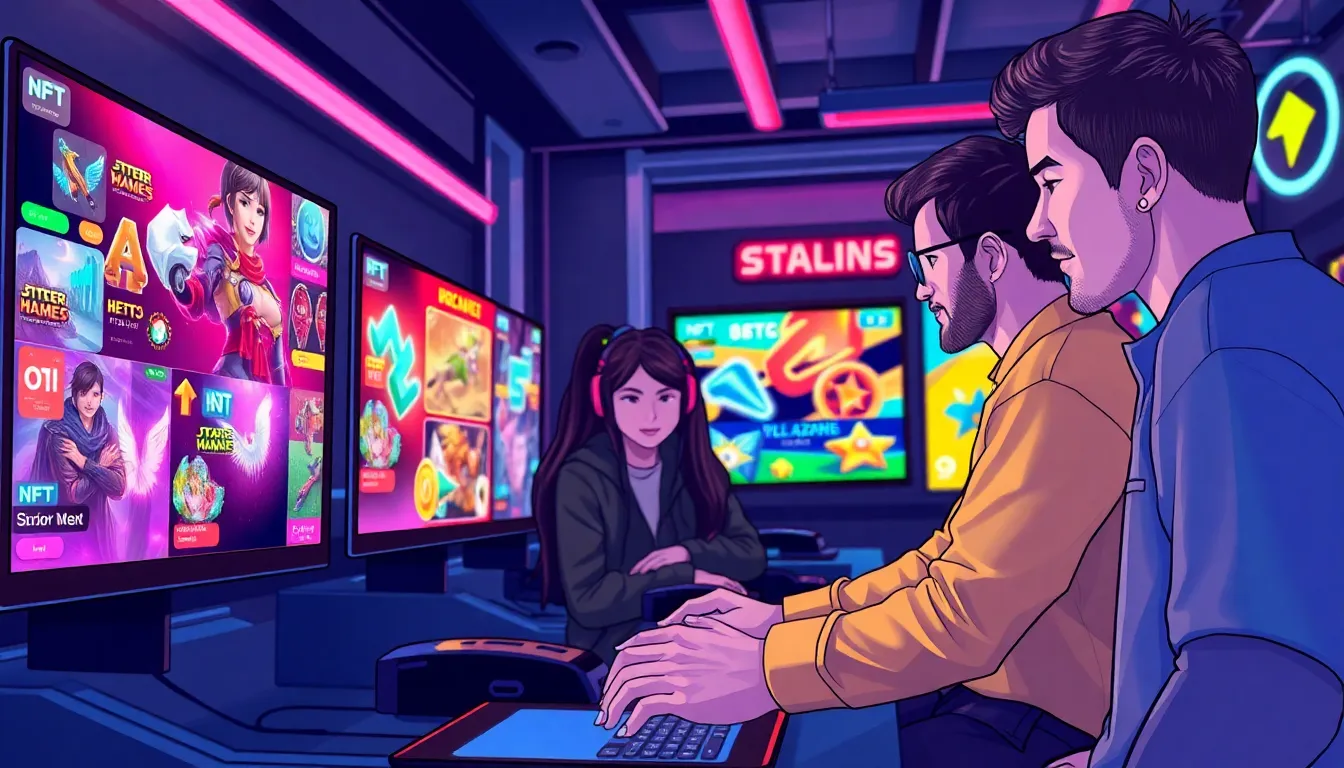In a world where virtual dragons can be as valuable as real estate, NFT game development services are the golden ticket to gaming success. Picture this: players not only slay monsters but also collect unique digital assets that could fund their next vacation. It’s a thrilling blend of gaming and investment that’s capturing the attention of both developers and players alike.
NFT Game Development Services
NFT game development services encompass a range of specialized offerings designed to create immersive gaming experiences with unique digital assets. These services include game design, blockchain integration, and smart contract development, ensuring every element functions seamlessly. Companies can provide tools for developing play-to-earn models, enhancing player engagement through real-world value.
The process starts with concept development, where developers define game mechanics and narratives. Game assets, such as characters and environments, follow a tailored approach, ensuring creativity aligns with market demands. Blockchain technology plays a crucial role, enabling transparent ownership and secure transactions for in-game assets.
Developers can utilize various blockchain platforms, including Ethereum, Binance Smart Chain, and Solana. Each platform presents unique advantages, influencing decision-making based on scalability, transaction speed, and cost. Smart contracts enhance in-game economy, automatically executing transactions and maintaining fairness among players.
Testing and quality assurance ensure that games meet industry standards. This aspect catches bugs and glitches that might disrupt the gameplay experience. Post-launch support remains essential, allowing developers to implement updates and maintain player engagement.
User experience design focuses on intuitive interfaces. An engaging user interface attracts and retains players, contributing to a game’s overall success. Adopting marketing strategies amplifies visibility in a crowded market, drawing in potential players eager to explore the unique offerings.
These components make NFT game development services a comprehensive solution for creating innovative games that resonate with modern players, merging entertainment and investment opportunities.
Key Features of NFT Games

NFT games offer distinct advantages that enhance the player experience. Unique asset ownership serves as a primary feature, allowing players to possess in-game items as verifiable digital assets. Each item comes with a blockchain-encoded certificate, ensuring authenticity. Players can trade these assets on various marketplaces, increasing their real-world value and promoting a player-driven economy.
Decentralization and transparency significantly influence NFT games. Blockchain technology fosters an open system, where players can verify transactions independently. This transparency bolsters trust among users, as they confirm the ownership history of assets. Decentralized platforms limit the risks of hacks and fraud, enhancing security. Moreover, by eliminating centralized control, players maintain greater power over their assets, ensuring a fairer gaming environment.
Benefits of NFT Game Development
NFT game development offers numerous advantages that can significantly enhance the gaming landscape. Developers and players alike stand to gain from these innovative features.
Enhanced User Engagement
User engagement amplifies in NFT games through unique experiences. Players assume ownership of in-game assets, making their gameplay more personalized and meaningful. Various types of digital items appeal to diverse player preferences. These assets can be traded or sold, allowing players to monetize their skills and investments. Gamers invest more time in gameplay as they navigate a vibrant economy. Communities often flourish around shared interests, resulting in social interactions that enrich the overall gaming experience. Positive player engagement influences game popularity and attracts newcomers.
New Revenue Streams
New revenue streams emerge with NFT game development. Developers can implement innovative monetization strategies by creating digital assets tied to real-world value. Secondary markets facilitate the trading of in-game items, generating transaction fees for developers. Players frequently participate in this economic ecosystem, boosting overall game profitability. Offering exclusive content or limited edition items can entice players to spend more on unique experiences. Subscriptions and play-to-earn models also provide sustainable income options. As the demand for NFTs grows, developers benefit from heightened interest within the marketplace. This creates opportunities for expansion and ongoing revenue generation in line with market trends.
Popular NFT Game Development Platforms
Numerous platforms now support NFT game development, each offering unique features and capabilities.
Ethereum leads as the most popular platform due to its robust smart contract functionality and extensive developer community. Many NFT games utilize Ethereum for token standards like ERC721 and ERC1155 to ensure unique asset creation.
Binance Smart Chain provides faster transaction times and lower fees, making it appealing for developers looking to build scalable games. This platform has gained traction as a cost-effective alternative to Ethereum.
Solana is recognized for its high throughput and low costs. Developers favor Solana for creating games that demand quick, smooth interactions, which enhances the overall player experience.
Polygon serves as a layer-2 solution on Ethereum, offering scalability while maintaining security. Its benefits attract developers wanting to leverage Ethereum’s ecosystem without high gas fees.
Flow stands out for its user-friendly interface and emphasis on mainstream adoption. Suitable for developers targeting casual gamers, Flow simplifies asset trading and enhances user engagement.
WAX targets the digital collectible market specifically, known for its energy-efficient blockchain and seamless NFT transactions. This focus allows developers to create games that appeal to collectors and casual players alike.
Avalanche features high-speed transactions and compatibility with Ethereum assets. This platform’s flexibility supports developers seeking innovative gameplay mechanics in their NFT games.
These platforms cater to diverse needs in the NFT game development space, allowing developers to choose based on their specific project goals. Each one contributes to the evolving landscape of gaming, highlighting the potential of NFTs in creating immersive and engaging experiences.
Choosing the Right NFT Game Development Service Provider
Selecting a suitable NFT game development service provider requires careful consideration of several factors. Experience stands out as a critical aspect. Providers with a proven track record in game development and blockchain technology offer valuable insights and expertise.
Reputation also plays a significant role. Researching client testimonials and case studies helps gauge a provider’s reliability and quality of work. Focusing on providers known for delivering successful projects ensures a higher chance of achieving desired outcomes.
Specialization can impact the overall project. Some providers concentrate on specific game genres or blockchain platforms. Identifying a provider that matches particular project requirements improves the alignment of goals and capabilities.
Understanding the offered services is essential. Services such as game design, blockchain integration, and smart contract development need to be thoroughly reviewed. A comprehensive approach that includes post-launch support and marketing strategies enhances project longevity and player engagement.
Development processes also vary between providers. Evaluating their methodologies, like Agile or Waterfall, impacts project timelines and flexibility. Agile practices often allow for iterative improvements, while Waterfall approaches may cater to projects with well-defined requirements.
Cost considerations play a significant part in the decision-making process. While aiming for quality, it’s essential to assess budget constraints and potential return on investment from the project. Requesting detailed quotes helps in comparing offerings based on value rather than just price.
Finally, communication and collaboration should not be overlooked. Effective communication facilitates smoother project progression and addresses concerns promptly. Prioritizing providers with strong communication skills ensures alignment during the development journey.
Conclusion
NFT game development services are reshaping the gaming landscape by combining entertainment with real-world value. This innovative approach not only enhances player engagement but also creates new opportunities for developers through diverse monetization strategies.
As the demand for NFTs continues to rise, choosing the right development partner becomes crucial. A focus on experience and specialization ensures that projects align with market trends and player expectations.
With the right blend of technology and creativity, NFT games can offer immersive experiences that captivate players and foster vibrant in-game economies. The future of gaming is here, and it’s driven by the unique possibilities that NFTs bring to the table.

